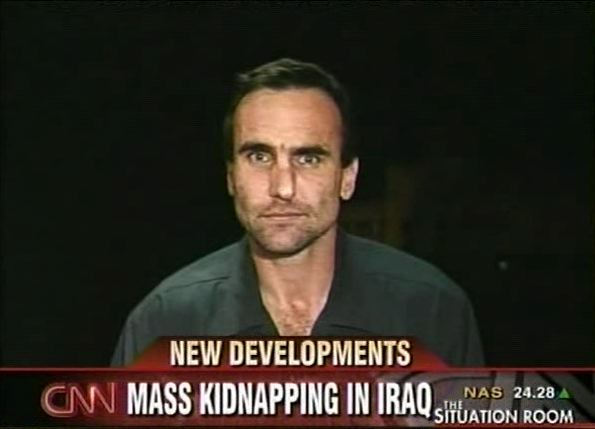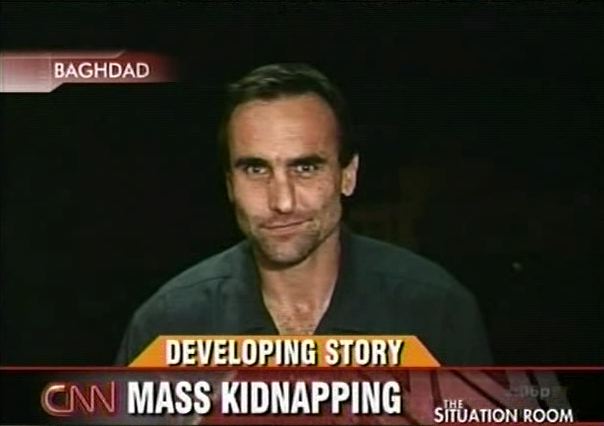TSR: Who did it, and why?

Click photo to play
Length: 3:44
WOLF BLITZER: Up first this hour, vivid and violent new evidence that the U.S. mission to shore up security in Iraq is far from being accomplished. Gunmen snatched dozens of police from a Baghdad research institute today, possibly the largest and most brazen mass kidnapping of the war and it comes exactly a week after voters in this country showed they want a change of course in Iraq.
CNN's Michael Ware is in Baghdad.
MICHAEL WARE, CNN CORRESPONDENT: In the hours that have followed this stunning kidnap operation, conducted under the very noses of the tens of thousands of American and Iraqi troops in the capital, Baghdad, a number of Iraqi police commanders responsible for this part of this city are now being interrogated. And perhaps, some might say, for good reason.
(BEGIN VIDEOTAPE)
WARE (voice-over): Iraqi security forces move in to seal off a Baghdad university building. But like so much in Iraq, it's too little, too late. Just a short time earlier, about 80 gunmen in similar Army or police uniforms had also set up a cordon before pouring inside this four-story research institute, claiming to be on official business, segregating men from women and within 20 minutes, escaping in a convoy of more than 20 vehicles, taking the men hostage. The exact number unknown; police saying as many as 60, a government minister saying it's up to 100. The only ones left behind -- the distraught women.
The sophisticated raid, executed at 10:00 a.m., just after rush hour, was audacious. So many gunmen, so many hostages, possibly the largest mass kidnapping of the war, all within the heart of the capital with more than 60,000 American and Iraqi troops on the streets.
The breath-taking scale of the kidnapping, a counterpoint to the previous day's visit by America's top commander in the region, General John Abizaid. Preparing to brief Congress, the general's quick trip was designed to show U.S. support for Iraq's ailing government and according to Iraqi officials, to press for rehabilitation of the country's security forces.
Need for that rehabilitation illustrated by the next morning's kidnappings, a clear sign of either the government's inability to control its own forces, or its weakness in the face of an unwavering and robust insurgency that, in the first 13 days of November, has already claimed the lives of more than 30 American servicemen.
Following the kidnap operation, university classes were canceled across the city.
EBED THEYAB, HIGHER EDUCATION MINISTER (through translator): I'm not ready to see more professors get killed. I have only one choice which is to suspend classes at universities. We have no other choice.
WARE: His choice is token. Few students or professors have dared attend lectures since the semester began two months ago. Waves of kidnappings and assassinations of the country's intelligentsia long ago made study too dangerous.
(END VIDEOTAPE)
WARE: Wolf, it now seems that danger is compounded. With U.S. strategic policy now in limbo in the aftermath of the midterm election upheaval, it appears that neither the Sunni insurgents nor the Shia militias buried deep within this Iraqi government that America is turning to as an ally, are willing to relent from their violent campaigns.

Click photo to play
Length: 3:22
WOLF BLITZER: There's still no claim of responsibility for this mass kidnapping, which is a familiar tactic, as Jamie points out, of both insurgents and sectarian death squads.
Just a short while ago, I spoke with CNN's Michael Ware in Baghdad.
What is the likely expectation? What happens to these individuals, I take it mostly men, if not all men, who were kidnapped.
MICHAEL WARE, CNN CORRESPONDENT: Certainly.
There were all men, as far as we are aware, who were kidnapped during the course of this clearly well-orchestrated raid right under the noses of as many as 50,000 or 60,000 American and Iraqi troops on the streets of Baghdad.
What we see in the past, from brutal experience, is that these stories often end rather grimly. We don't know if this is sectarian motivated. We've seen circumstances in the past where groups of people are taken and then either the Sunnis or the Shias are let go, with a sad fate for those who are not.
We're waiting to see what becomes of these scores of kidnapped who have been taken.
BLITZER: My initial reaction when I heard about it, these gunmen dressed as Iraqi military personnel going in an kidnapping what would widely be considered intelligentsia, the elite -- scientists, doctors, going into the Ministry of Education, this building. They're also trying to send a message to this community of, shall we say, the more liberal elite of Iraq, that maybe they should think about getting out of that country.
WARE: Very clearly. I mean I think there's a twofold message, either directly or indirectly behind this. One clearly is what you hit upon. This is a direct assault on the country's brains trust, its intelligentsia. We have seen a campaign targeting these people since the immediate aftermath of the invasion.
In the beginning it was led by criminals which were looking to extort the families of the doctors, the lawyers, the judges, the engineers, the scientists, the professors. We've since seen that evolve into targeted campaigns by both Sunnis and Shias -- Wolf.
This is also a message, though, coming directly the day after the visit of General John Abizaid, looking for more support from the Iraqi government. And lo and behold, men in Iraqi government uniforms conduct this kind of operation.
BLITZER: It sends a powerful message to the Iraqi government.
They have to really get their act together.
Do you see -- very briefly, Michael -- any evidence they're doing that?
WARE: Absolutely not. And I think this morning, in fact, shows the contrary position is true. I mean what we're seeing is the government giving whatever assurances it is giving to the U.S. administration. Yet through a lack of genuine will or through a lack of any effective power, it's clearly displaying it cannot control its own security forces, and perhaps this morning's daring kidnap is the most glaring illustration of that -- Wolf.
BLITZER: Michael Ware reporting for us from Baghdad.
Michael, thanks very much.
WARE: Thank you, Wolf.
